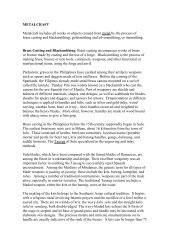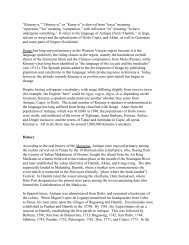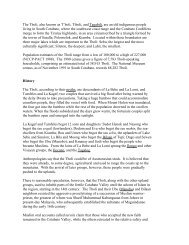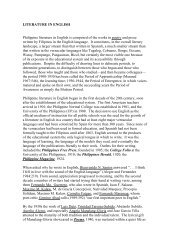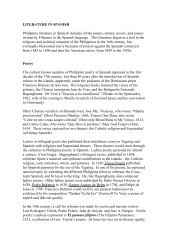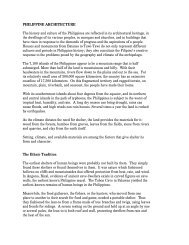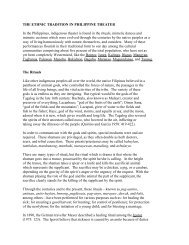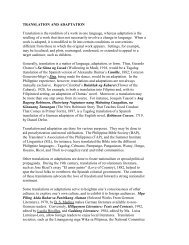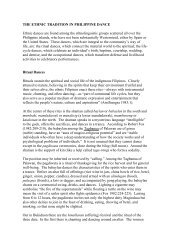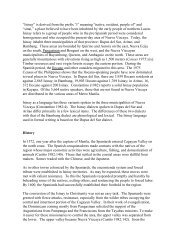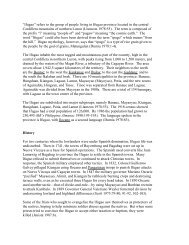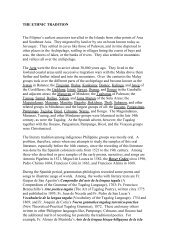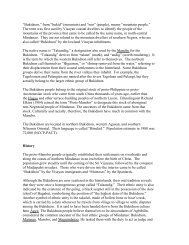The word “Ibanag” derives from the prefix “i” meaning ... - Buffalo
The word “Ibanag” derives from the prefix “i” meaning ... - Buffalo
The word “Ibanag” derives from the prefix “i” meaning ... - Buffalo
You also want an ePaper? Increase the reach of your titles
YUMPU automatically turns print PDFs into web optimized ePapers that Google loves.
settlers like <strong>the</strong> Ilocano, <strong>the</strong> Tagalog, and <strong>the</strong> Pampango are beginning to influence <strong>the</strong><br />
Ibanag into producing rice in commercial quantities (Llamzon 1978:41). Many logging<br />
firms now operate in Cagayan, for which <strong>the</strong> province has <strong>the</strong> largest volume of<br />
standing timber in <strong>the</strong> region. <strong>The</strong> manufacturing industry is limited to small food<br />
industries, such as bagoong (fish paste) and patis (fish sauce) making, rice milling,<br />
coconut dessication, and soap making.<br />
Economy<br />
<strong>The</strong> Ibanag’s chief product is rice followed by tobacco. Rice production is done by<br />
mutual assistance among <strong>the</strong> villagers, <strong>from</strong> plowing to harvesting. Assistance is in<br />
lending a plow or animal or in sharing of <strong>the</strong> harvest: 1/3 of <strong>the</strong> harvest goes to <strong>the</strong><br />
landowner, 2/3 to <strong>the</strong> tenant or principal tiller. One half of <strong>the</strong> share of <strong>the</strong> tenant is<br />
distributed to <strong>the</strong> volunteers who each get one basket of rice for every 10 baskets <strong>the</strong>y<br />
reap while assisting in harvesting.<br />
Sharing <strong>the</strong> produce is observed in fishing and piggery. In fishing, <strong>the</strong> owner of <strong>the</strong><br />
banca and net gets half of <strong>the</strong> catch while <strong>the</strong> o<strong>the</strong>r half is equally shared by o<strong>the</strong>r<br />
fishers; <strong>the</strong> owner gets ano<strong>the</strong>r share <strong>from</strong> this partition. In pig raising, <strong>the</strong> sow is<br />
given to a caretaker who agrees to give <strong>the</strong> owner one piglet for every litter of four. If<br />
<strong>the</strong> available number of piglets is less than four, <strong>the</strong> caretaker gets all; when <strong>the</strong>re are<br />
seven, <strong>the</strong> owner gets two.<br />
Borrowing money is resorted to in time of need. <strong>The</strong> practice is to give a cavan of corn<br />
every harvest for every 100 pesos borrowed. This mode of payment continues until<br />
<strong>the</strong> loan is paid. Sometimes, farmers pay as much as a third of <strong>the</strong> harvest for only <strong>the</strong><br />
interest on <strong>the</strong> money borrowed.<br />
Aside <strong>from</strong> agriculture, o<strong>the</strong>r gainful occupations in <strong>the</strong> area include animal husbandry,<br />
forestry, fishing, and hunting (Census 1980:xxix). Some Ibanag are production workers,<br />
transport equipment operators and laborers, while o<strong>the</strong>rs are professional, technical,<br />
and service workers. People in administrative, executive, and/or managerial positions in<br />
private or public organizations comprise <strong>the</strong> smallest percentage of <strong>the</strong> work force.<br />
Political System<br />
<strong>The</strong> head of <strong>the</strong> traditional Ibanag community was called <strong>the</strong> dakal na barangay.<br />
Among <strong>the</strong> early Ibanag, this leader was not someone whose authority was imposed<br />
on <strong>the</strong> people (Gatan 1981:16). Ra<strong>the</strong>r, <strong>the</strong> leader must be one of <strong>the</strong>m, someone <strong>from</strong><br />
<strong>the</strong>ir stock. <strong>The</strong>re were times when <strong>the</strong> central govermnent would appoint a head of<br />
<strong>the</strong> barangay who would be given all <strong>the</strong> rights and privileges of <strong>the</strong> office.<br />
Simultaneously, <strong>the</strong> people <strong>the</strong>mselves would acknowledge a leader of <strong>the</strong>ir own. To<br />
<strong>the</strong> Ibanag, a leader should have charisma and honesty; <strong>the</strong> ability to control or placate<br />
<strong>the</strong> people; and <strong>the</strong> intelligence to discover solutions to <strong>the</strong> problems of <strong>the</strong>



